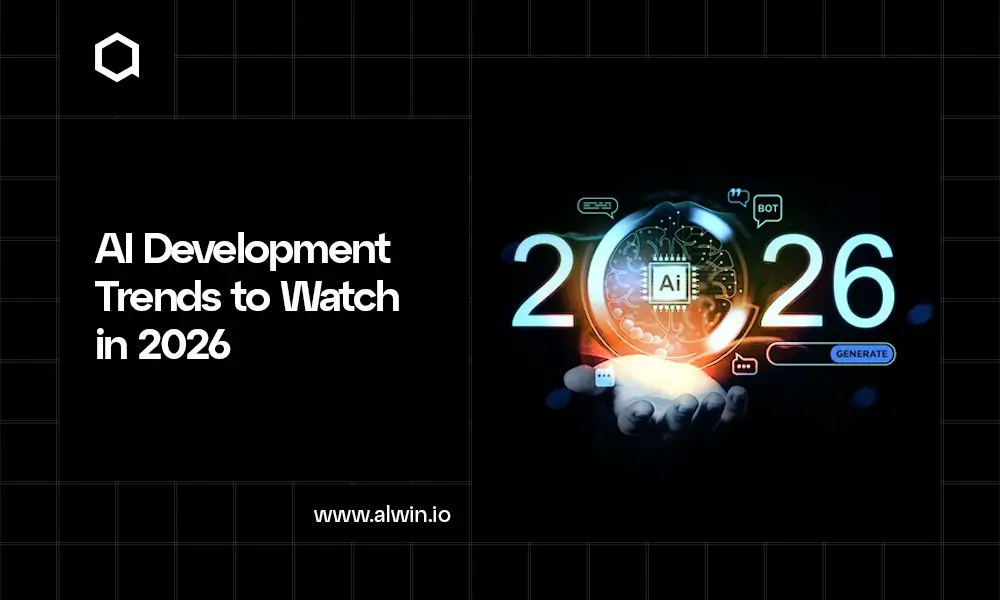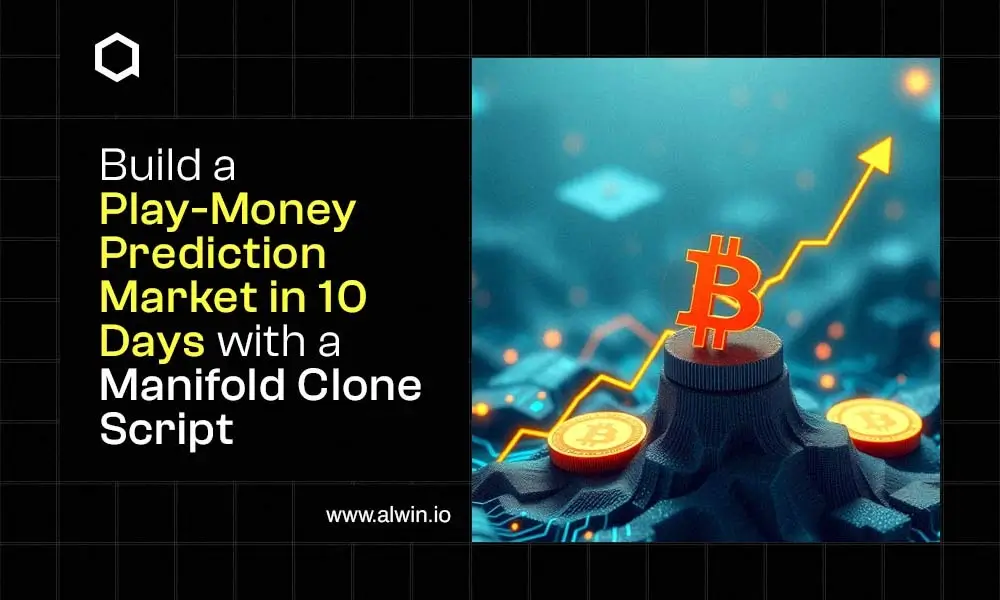Decentralized prediction markets (DPMs) enable users to forecast future events using blockchain technology. These markets operate without a central authority, allowing direct participation in predicting outcomes across various topics, such as elections and sports. This structure enhances security, transparency, and resistance to censorship.
Polymarket is a prominent example of a DPM. Built on the Ethereum sidechain Polygon, it allows users to bet on diverse events, leveraging smart contracts and oracles for real-time trading and accurate outcome verification.
In 2024, the decentralized prediction market industry was valued at approximately $1.4 billion, with projections indicating it could reach $95.5 billion by 2035, growing at a compound annual growth rate (CAGR) of 46.8% from 2025 to 2035.
This article explores the key benefits of developing a Polymarket-inspired decentralized prediction market, providing insights for potential investors and aspiring entrepreneurs interested in this emerging sector.
Understanding Decentralized Prediction Markets
Decentralized prediction markets (DPMs) are platforms that allow users to bet on the outcomes of future events using cryptocurrencies. They operate without a central authority, enabling direct participation in forecasting various events, such as elections or sports results.
DPMs utilize a binary outcome model, where participants typically answer yes/no questions, similar to platforms like Polymarket.
For instance, a market might ask, "Will Candidate A win the election?" Participants can buy shares in the outcome they believe will occur, with prices reflecting the perceived likelihood of each outcome based on market consensus.
Blockchain technology is fundamental to Decentralized Prediction Markets, ensuring transparency and security. Each transaction is recorded on a public ledger, making it difficult to manipulate or censor the market.
Smart contracts play a crucial role by automating transactions and defining the terms of each prediction market.
These self-executing contracts contain the rules for betting and payout conditions, ensuring that payouts are distributed automatically based on the outcomes once an event concludes.
Oracles are also essential in DPMs, providing real-world data for verifying event results. They bridge the blockchain and external data sources, allowing smart contracts to execute based on accurate information.
This combination of blockchain, smart contracts, and oracles creates a robust framework for decentralized prediction markets, enhancing their reliability and user trust.
Polymarket Clone Script
A Polymarket clone script is a pre-designed, customizable software solution for building a decentralized prediction market platform akin to Polymarket. It enables you to create a secure and decentralized ecosystem where users can participate in prediction markets, share forecasts, and engage in decentralized financial activities.
Key Benefits of Building a Polymarket-Inspired Decentralized Prediction Marketplace Platform
Enhanced Transparency and Trust
Decentralization is at the core of DPMs, fostering trust among users by removing intermediaries. In a Polymarket-inspired platform, all transactions are recorded on the blockchain, ensuring transparency and immutability.
This allows users to verify trades independently, enhancing confidence in the platform's integrity. As a result, participants can engage without fear of manipulation or censorship.
Lower Transaction Costs
Polymarket operates on the Polygon network, which significantly reduces transaction fees compared to traditional prediction markets like PredictIt.
While PredictIt charges users around 10% on winnings due to regulatory compliance and operational overhead, Polymarket's decentralized nature allows for much lower fees, often approaching 0.5% or less.
This cost efficiency encourages higher trading volumes and more active participation.
Increased Accessibility
A major advantage of a Polymarket-inspired platform is open participation without Know Your Customer (KYC) requirements. Users can engage freely without providing personal information, democratizing access to betting markets.
This inclusivity attracts a diverse user base, allowing individuals from various backgrounds to participate in predicting events globally.
Real-Time Market Data
Access to live market data is crucial for making informed predictions. A decentralized prediction market provides real-time updates on trading activity and market movements, enabling users to adjust their strategies based on current trends.
This immediacy enhances the overall user experience and increases the accuracy of predictions as participants can respond quickly to changing information.
Diverse Market Options
Polymarket allows users to bet on a wide range of events, including politics, sports, entertainment, and economic indicators. This variety caters to different interests and encourages broader participation.
By offering numerous market options, a Polymarket-inspired DEX platform can attract users with diverse preferences, enhancing engagement and fostering a vibrant trading community.
User Engagement and Community Dynamics
Decentralized prediction markets empower users to contribute insights and predictions, fostering a community-driven approach to market creation. Participants can share their analyses and forecasts, enriching the collective knowledge base of the platform.
This democratization of information encourages collaboration and dialogue among users, creating an environment where diverse perspectives can thrive.
As a result, the platform becomes not just a trading venue but a vibrant community where participants actively shape the market landscape.
Gamification Strategies
To enhance user engagement, Polymarket-inspired platforms often incorporate gamification strategies. Features such as trading competitions, leaderboards, and rewards for accurate predictions create an interactive experience that motivates users to participate actively.
By introducing elements of competition and recognition, these platforms can increase user retention and satisfaction.
Gamification not only makes the experience more enjoyable but also encourages users to deepen their understanding of market dynamics and improve their predictive skills.
Community-Driven Growth
User feedback plays a critical role in shaping platform features and policies. A Polymarket-inspired platform that prioritizes community input can adapt more effectively to user needs and preferences.
By actively soliciting feedback through surveys, forums, or direct communication channels, the platform can implement changes that enhance user satisfaction and retention. This community-driven growth model fosters loyalty among users, as they feel their voices are heard and valued in the evolution of the platform.
Ultimately, this collaborative approach strengthens the community and contributes to the long-term success of the decentralized prediction market.
Practical Applications and Use Cases
Decentralized prediction markets (DPMs) are increasingly utilized for investment strategies and market predictions based on real-world events. By aggregating the collective insights of participants, these platforms provide valuable information that can inform investment decisions.
For instance, traders can gauge market sentiment regarding economic indicators or corporate earnings by observing the outcomes predicted in DPMs.
In 2024, platforms like Polymarket reported over $128 million in trades related to financial outcomes, demonstrating their effectiveness in forecasting market movements.
Political Predictions
DPMs have proven particularly effective in political predictions, offering insights into election outcomes and public sentiment analysis. Case studies show that markets can accurately forecast election results by reflecting real-time public opinion.
For example, during the 2024 U.S. presidential election cycle, prediction markets provided a continuous stream of data that indicated shifting voter sentiments, allowing users to adjust their strategies accordingly.
The ability to predict political events with high accuracy has made DPMs a valuable tool for analysts and campaign strategists alike.
Entertainment Trends
Another significant application of DPMs is in predicting outcomes related to entertainment trends, such as sports events and pop culture phenomena. Users can place bets on various outcomes, from the winner of a major sporting event to the success of a new movie release.
For example, during the UEFA Euro Cup, trading volumes on platforms like Polymarket surged from $6.1 million to $42 million per month as users speculated on match results and team performances.
This engagement not only enhances the viewing experience for fans but also provides a unique lens through which to analyze trends in the entertainment and sports industries.
Risks and Challenges to Consider
One of the primary risks associated with decentralized prediction markets (DPMs) is market volatility. Prices can fluctuate significantly based on new information, user sentiment, and external events, leading to unpredictable outcomes. This volatility can create profit opportunities but also poses risks for participants who may face substantial losses if they misjudge market movements.
Additionally, misinformation can spread quickly in these environments, potentially skewing predictions and affecting market stability. Users must remain vigilant and conduct thorough research to navigate these uncertainties effectively.
Legal and Regulatory Issues
Decentralized platforms face various legal and regulatory challenges, particularly in the United States. The regulatory landscape for prediction markets is complex, as they often intersect with gambling laws, securities regulations, and anti-money laundering requirements.
In some jurisdictions, DPMs may be classified as illegal gambling operations, which can lead to significant legal repercussions for operators and users alike.
As regulators continue to scrutinize the cryptocurrency space, potential investors must stay informed about the evolving legal framework that could impact their participation in these markets.
Technical Challenges
Building a robust decentralized prediction market platform comes with technical challenges that must be addressed to ensure a smooth user experience. Security vulnerabilities are a major concern; smart contracts can be susceptible to exploits if not properly audited.
Additionally, network congestion on blockchain platforms can lead to slow transaction times and increased fees, impacting user satisfaction. Developers must prioritize security measures and user-friendly design to mitigate these risks and enhance the overall functionality of the platform.
Continuous updates and improvements are essential to maintain user trust and engagement in a rapidly evolving technological landscape.
Future Outlook for Decentralized Prediction Markets
The future of decentralized prediction markets (DPMs) is poised for significant enhancement through the integration of emerging technologies such as artificial intelligence (AI) and data analytics. These technologies can improve prediction accuracy by analyzing vast datasets and identifying patterns that human participants may overlook.
For instance, AI algorithms can process real-time data from various sources, including social media sentiment and market trends, to provide users with more informed insights.
Additionally, partnerships with Internet of Things (IoT) devices can facilitate real-time event tracking, further refining the predictive capabilities of DPMs. As these technologies evolve, they will create more interactive and engaging user experiences, attracting a broader audience to decentralized platforms.
Regulatory Developments
Anticipated regulatory changes will play a crucial role in shaping the landscape of decentralized prediction markets. Currently, the lack of clear regulations hampers widespread adoption and creates uncertainty for users and developers alike.
However, as governments around the world begin to establish clearer frameworks for blockchain technology and cryptocurrency, DPMs could see increased legitimacy and user trust.
In the United States, for example, ongoing discussions regarding the regulation of digital assets may lead to more defined guidelines that could facilitate safer and more compliant operations for DPMs.
Such developments would likely encourage greater participation from institutional investors and mainstream users.
Expansion Opportunities
Decentralized prediction markets hold significant potential for expansion beyond traditional sectors like entertainment and politics. Emerging use cases in areas such as environmental forecasting, healthcare predictions, and economic indicators are gaining traction.
For instance, DPMs could be utilized to predict climate events or public health outcomes, providing valuable insights that could inform policy decisions and resource allocation.
Additionally, niche markets focusing on specific industries or events could attract targeted user bases, further diversifying the applications of DPMs.
As these platforms continue to evolve, they will likely uncover new opportunities that enhance their relevance across various fields, solidifying their position as a vital tool for forecasting in an increasingly complex world.
Conclusion
Decentralized prediction markets (DPMs) offer numerous advantages, including enhanced transparency, lower transaction costs, increased accessibility, real-time market data, and diverse betting options. These benefits improve user experience and foster a collaborative environment for accurate predictions.
As the decentralized finance landscape evolves, there are significant opportunities for developers and investors in decentralized prediction market development. By leveraging the unique strengths of DPMs, stakeholders can innovate and democratize access to predictive forecasting across various sectors. The future of prediction markets is promising, presenting exciting prospects for those willing to engage in this dynamic industry.



